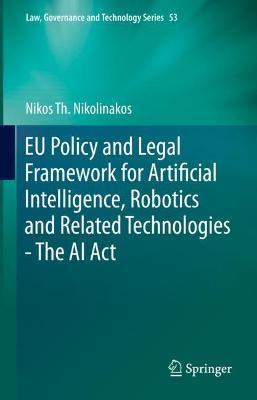Eu Policy and Legal Framework for Artificial Intelligence, Robotics and Related Technologies - The AI ACT

Eu Policy and Legal Framework for Artificial Intelligence, Robotics and Related Technologies - The AI ACT
Artificial Intelligence (AI) can benefit our society and economy, but also brings with it new challenges and raises legal and ethical questions. According to the author of this comprehensive analysis, it is imperative to ensure that AI is developed and applied in an appropriate legal and regulatory framework that promotes innovation and investment and, at the same time, addresses the risks associated with certain uses of AI-related technologies.
Essential to understanding the relationship between policy and law, this book traces the evolution of EU policy on artificial intelligence and robotics, focusing in particular on the EU's ethical framework for AI, which defines trust as a prerequisite for ensuring a human-centric approach.
The main part of the book provides a thorough and systematic analysis of the Commission's 2021 proposed AI Act, which establishes harmonised rules for the development, placement on the market and use of AI systems in the EU. The author painstakingly compares the Commission's proposed AI Act with the numerous "compromise" proposals of the Council of the European Union, leading to the final version of the Council's AI Act (general approach) and its formal adoption on 6 December 2022. The author also examines with extraordinary detail the amendments proposed by the relevant committees and political groups of the European Parliament, revealing the position the Parliament is likely to adopt in the forthcoming negotiations with the Commission and the Council on the text of the AI Act.Numerous legislative and policy documents are presented in detail, while the analysis also considers the comments made by all interested parties (e.g. the European Commission, Council of the European Union, European Parliament, governmental organisations, national competent authorities, and stakeholders/actors with different/conflicting interests, such as corporations, business and consumer associations, civil society and other non-profit organisations).
In the course of its in-depth analysis, this book will provide readers with crucial insight into the reasons behind the European Institutions' different approaches and the often contradictory interests of stakeholders. Because the policy arguments are carefully balanced and drafted with scrupulous care, this volume will establish itself as a reference resource to be consulted for years to come.
PRP: 1022.91 Lei
Acesta este Pretul Recomandat de Producator. Pretul de vanzare al produsului este afisat mai jos.
920.62Lei
920.62Lei
1022.91 LeiLivrare in 2-4 saptamani
Descrierea produsului
Artificial Intelligence (AI) can benefit our society and economy, but also brings with it new challenges and raises legal and ethical questions. According to the author of this comprehensive analysis, it is imperative to ensure that AI is developed and applied in an appropriate legal and regulatory framework that promotes innovation and investment and, at the same time, addresses the risks associated with certain uses of AI-related technologies.
Essential to understanding the relationship between policy and law, this book traces the evolution of EU policy on artificial intelligence and robotics, focusing in particular on the EU's ethical framework for AI, which defines trust as a prerequisite for ensuring a human-centric approach.
The main part of the book provides a thorough and systematic analysis of the Commission's 2021 proposed AI Act, which establishes harmonised rules for the development, placement on the market and use of AI systems in the EU. The author painstakingly compares the Commission's proposed AI Act with the numerous "compromise" proposals of the Council of the European Union, leading to the final version of the Council's AI Act (general approach) and its formal adoption on 6 December 2022. The author also examines with extraordinary detail the amendments proposed by the relevant committees and political groups of the European Parliament, revealing the position the Parliament is likely to adopt in the forthcoming negotiations with the Commission and the Council on the text of the AI Act.Numerous legislative and policy documents are presented in detail, while the analysis also considers the comments made by all interested parties (e.g. the European Commission, Council of the European Union, European Parliament, governmental organisations, national competent authorities, and stakeholders/actors with different/conflicting interests, such as corporations, business and consumer associations, civil society and other non-profit organisations).
In the course of its in-depth analysis, this book will provide readers with crucial insight into the reasons behind the European Institutions' different approaches and the often contradictory interests of stakeholders. Because the policy arguments are carefully balanced and drafted with scrupulous care, this volume will establish itself as a reference resource to be consulted for years to come.
Detaliile produsului









